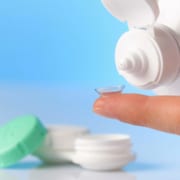3 Vision Disorders You May Not Have Known Are Genetic
When it comes to your genes, you have more than your parents to thank for your overwhelmingly good looks; you have your grandparents, great-grandparents, and so on. And although your genetics may have played a large part in making your face the talk of the town, your genetics may also give you some grief; especially in the eye department. Let’s delve a little deeper and look at three vision disorders you may not have known were genetic.
Cataracts
Your neighbor’s cat has them, your grandmother may have had them, and you may get them as you age. Although age and injury are two of the leading causes of cataracts, scientific studies also point to the fact that cataracts also have some genetic influence.
Nearsightedness (myopia)
The exact cause of myopia is unknown, but there is a lot of scientific evidence that points to the fact that it is inherited. Although other strong factors play a role in myopia, it’s a good idea to look at your genetics as well.
Glaucoma
Glaucoma is the number one leading cause of blindness in patients in the United States. Luckily, if it’s caught early on, it can easily be treated. Because genetics play such a significant role in glaucoma, one of the best ways to detect glaucoma early on is to look at your family history.
Take a look at your family history. Do you know if anybody in your family tree has or had any of these vision problems? If so, let Dr. Jeffrey Maehara know during our next eye exam. To learn more about genetically influenced vision problems or to schedule your next eye exam, contact our Honolulu office today and call us at 808.955.3937.




 The New Year is all about reinventing yourself and setting goals that you hope to achieve. As one way to reinvent yourself, many people like to make cosmetic changes to their appearance by lightening their hair color or wearing colored contact lenses. As a fun way to change up your eye color, colored contact lenses are popular amongst every age group. However, did you know that colored contact lenses can cause blindness or eye injuries like ulcers? Read on to learn more.
The New Year is all about reinventing yourself and setting goals that you hope to achieve. As one way to reinvent yourself, many people like to make cosmetic changes to their appearance by lightening their hair color or wearing colored contact lenses. As a fun way to change up your eye color, colored contact lenses are popular amongst every age group. However, did you know that colored contact lenses can cause blindness or eye injuries like ulcers? Read on to learn more.
 Taking care of glasses as an adult can sometimes be a bit iffy, however, getting your child to take care of their glasses is a whole other process. As your child gets used to not only getting into the habit of wearing their glasses everyday, your child also needs to get into the habit of taking care of their eyeglasses everyday. From placing them in their proper case to taking precautions before taking sports, this article will discuss a few of the ways you can teach your child to care for their glasses.
Taking care of glasses as an adult can sometimes be a bit iffy, however, getting your child to take care of their glasses is a whole other process. As your child gets used to not only getting into the habit of wearing their glasses everyday, your child also needs to get into the habit of taking care of their eyeglasses everyday. From placing them in their proper case to taking precautions before taking sports, this article will discuss a few of the ways you can teach your child to care for their glasses.
